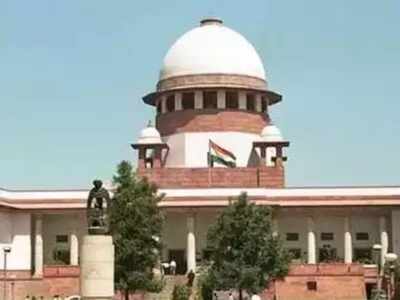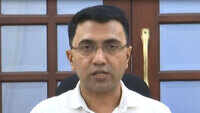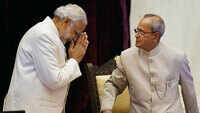
NEW DELHI: The Supreme Court on Monday strongly disapproved of the media and retired judges freely expressing their opinion on what should be the course adopted by the court in the contempt of court proceedings against activist-advocate Prashant Bhushan.
“The court cannot abdicate its duty and has to be uninfluenced by statements published in the media and opinions expressed therein. It has to decide the case uninfluenced by such opinions,” a bench of Justices Arun Mishra, B R Gavai and Krishna Murari said in its 82-page judgment punishing Bhushan for contempt.
Bhushan’s counsel Rajeev Dhavan had argued that the SC should consider various statements made by some retired judges, journalists and others and not punish his client for contempt and that it would give rise to another controversy, with a section criticising the SC and another justifying the punishment.
The bench said: “There is a substantial risk of serious prejudice through an effect upon the mind of an appellate judge by such publication. It was also emphasised that an act of making comments which are intended or even likely to influence a judge necessarily amounts to contempt.”
However, the SC refused to be drawn into “which retired judge said what” during pendency of the contempt proceedings. It said Dhavan’s arguments were “founded on the fact that the court should be influenced by the opinion expressed in newspapers and other media” when the court is hearing a matter.
“There are two facets of the argument. Firstly, whether the court should be moved by the statement published in the newspaper and secondly, whether, in sub judice matters, such statements are permissible to be made. We put a question to ourselves, as to whether the court can be guided by such opinions expressed on the public platform and as to whether the court, while exercising its judicial duties, render its decision on the basis of the trial made by the media and public opinion. Answers to both the questions are found firmly in the negative,” it said.
On the risk of getting criticised in the event of it punishing Bhushan, the bench said: “While exercising our judicial functions, we cannot take into consideration whether we will be praised or criticised for the judgment which we render. We are required to decide cases on the basis of the law as it correctly stands, in our perception and understanding. We are not expected to decide the matter on the basis as to whether there will be criticism of the judgment or not. We have to be always ready for its fair criticism.”
The SC quoted Dharmkosh-43 (Narad 36-4-5) in Sanskrit, and translated it: “Judges have to be impartial towards the crime of voice. Judges have to be well versed in the laws and impartial towards friends and foes. It emphasises that judges should be impartial towards friends and foes. In our opinion, the judicial decision cannot be influenced by the opinions expressed in the media.”
“The court cannot abdicate its duty and has to be uninfluenced by statements published in the media and opinions expressed therein. It has to decide the case uninfluenced by such opinions,” a bench of Justices Arun Mishra, B R Gavai and Krishna Murari said in its 82-page judgment punishing Bhushan for contempt.
Bhushan’s counsel Rajeev Dhavan had argued that the SC should consider various statements made by some retired judges, journalists and others and not punish his client for contempt and that it would give rise to another controversy, with a section criticising the SC and another justifying the punishment.
The bench said: “There is a substantial risk of serious prejudice through an effect upon the mind of an appellate judge by such publication. It was also emphasised that an act of making comments which are intended or even likely to influence a judge necessarily amounts to contempt.”
However, the SC refused to be drawn into “which retired judge said what” during pendency of the contempt proceedings. It said Dhavan’s arguments were “founded on the fact that the court should be influenced by the opinion expressed in newspapers and other media” when the court is hearing a matter.
“There are two facets of the argument. Firstly, whether the court should be moved by the statement published in the newspaper and secondly, whether, in sub judice matters, such statements are permissible to be made. We put a question to ourselves, as to whether the court can be guided by such opinions expressed on the public platform and as to whether the court, while exercising its judicial duties, render its decision on the basis of the trial made by the media and public opinion. Answers to both the questions are found firmly in the negative,” it said.
On the risk of getting criticised in the event of it punishing Bhushan, the bench said: “While exercising our judicial functions, we cannot take into consideration whether we will be praised or criticised for the judgment which we render. We are required to decide cases on the basis of the law as it correctly stands, in our perception and understanding. We are not expected to decide the matter on the basis as to whether there will be criticism of the judgment or not. We have to be always ready for its fair criticism.”
The SC quoted Dharmkosh-43 (Narad 36-4-5) in Sanskrit, and translated it: “Judges have to be impartial towards the crime of voice. Judges have to be well versed in the laws and impartial towards friends and foes. It emphasises that judges should be impartial towards friends and foes. In our opinion, the judicial decision cannot be influenced by the opinions expressed in the media.”
Download
The Times of India News App for Latest India News

Coronavirus outbreak
Trending Topics
LATEST VIDEOS
India
 5,500 candidates will appear for JEE, NEET in Goa: CM Pramod Sawant
5,500 candidates will appear for JEE, NEET in Goa: CM Pramod Sawant  PM Modi mourns former President’s demise
PM Modi mourns former President’s demise  Indore: MP Shankar Lalwani joins South Indian community in celebrating Onam
Indore: MP Shankar Lalwani joins South Indian community in celebrating Onam  Madhya Pradesh CM Chouhan surveys flood-hit Hoshangabad in boat
Madhya Pradesh CM Chouhan surveys flood-hit Hoshangabad in boat  Family members of militants are soft targets for ISI: J&K Police
Family members of militants are soft targets for ISI: J&K Police  On cam: Terrorists hurl grenade on Army Convoy in Baramulla
On cam: Terrorists hurl grenade on Army Convoy in Baramulla
More from TOI
Navbharat Times
Featured Today in Travel
Quick Links
Coronavirus in MumbaiCoronavirus in KolkataCoronavirus in HyderabadCoronavirus in DelhiCoronavirus in BangaloreCoronavirus symptomsCoronavirus in IndiaWhat is CoronavirusCoronavirus NewsSolar EclipseNPRWhat is NRCCAB BillCAB and NRCRTI BillPodcast newsLok SabhaShiv SenaYSRCPCongressBJP newsUIDAIIndian ArmyISRO newsSupreme Court
Get the app



